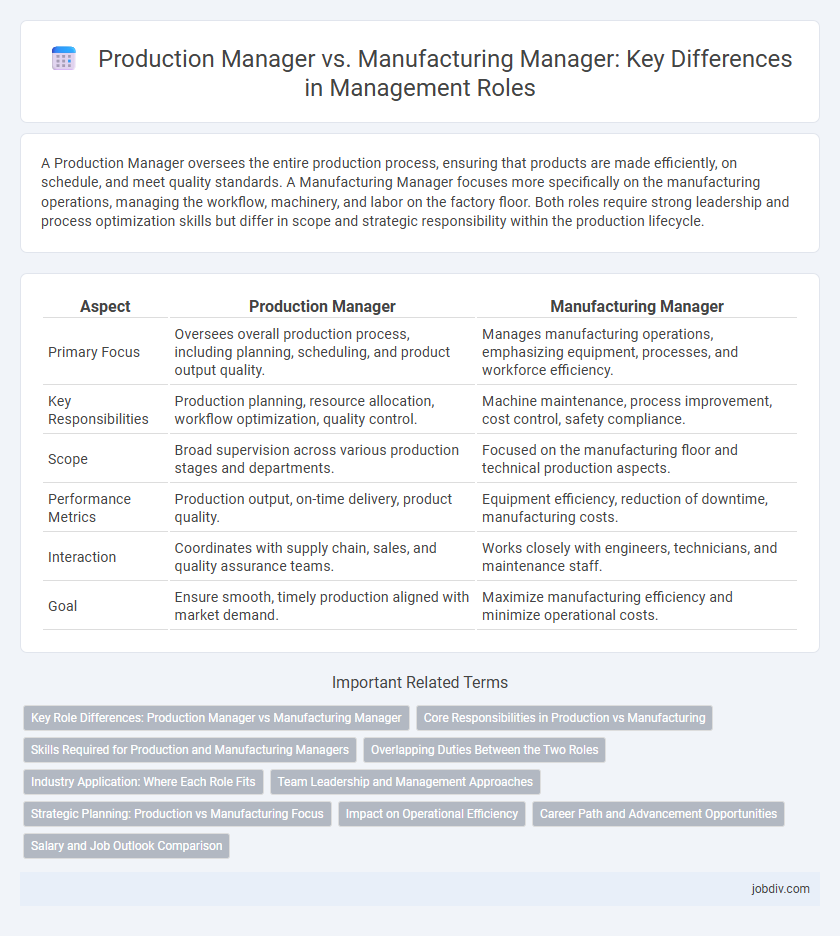A Production Manager oversees the entire production process, ensuring that products are made efficiently, on schedule, and meet quality standards. A Manufacturing Manager focuses more specifically on the manufacturing operations, managing the workflow, machinery, and labor on the factory floor. Both roles require strong leadership and process optimization skills but differ in scope and strategic responsibility within the production lifecycle.
Table of Comparison
| Aspect | Production Manager | Manufacturing Manager |
|---|---|---|
| Primary Focus | Oversees overall production process, including planning, scheduling, and product output quality. | Manages manufacturing operations, emphasizing equipment, processes, and workforce efficiency. |
| Key Responsibilities | Production planning, resource allocation, workflow optimization, quality control. | Machine maintenance, process improvement, cost control, safety compliance. |
| Scope | Broad supervision across various production stages and departments. | Focused on the manufacturing floor and technical production aspects. |
| Performance Metrics | Production output, on-time delivery, product quality. | Equipment efficiency, reduction of downtime, manufacturing costs. |
| Interaction | Coordinates with supply chain, sales, and quality assurance teams. | Works closely with engineers, technicians, and maintenance staff. |
| Goal | Ensure smooth, timely production aligned with market demand. | Maximize manufacturing efficiency and minimize operational costs. |
Key Role Differences: Production Manager vs Manufacturing Manager
A Production Manager primarily oversees the entire production process, ensuring that products are created efficiently, on time, and meet quality standards, while a Manufacturing Manager focuses specifically on the manufacturing operations, optimizing machinery, workflow, and labor to enhance output. Production Managers coordinate between departments such as procurement, quality control, and logistics, whereas Manufacturing Managers manage shop floor activities, maintenance, and production schedules. The key role difference lies in scope: Production Managers manage end-to-end product realization, while Manufacturing Managers concentrate on the technical and operational aspects within the manufacturing facility.
Core Responsibilities in Production vs Manufacturing
Production Managers oversee the planning, coordination, and control of manufacturing processes to ensure products are produced efficiently, on time, and within budget. Manufacturing Managers focus on the operational aspects of the production floor, including equipment maintenance, workflow optimization, and labor management to maintain consistent product quality and meet production targets. Both roles emphasize resource allocation and process improvement, but Production Managers prioritize end-to-end process planning while Manufacturing Managers concentrate on day-to-day factory operations.
Skills Required for Production and Manufacturing Managers
Production Managers require strong skills in process optimization, resource allocation, and team leadership to ensure efficient workflow and meet production goals. Manufacturing Managers must have deep technical knowledge of manufacturing systems, quality control, and equipment maintenance to oversee production line operations effectively. Both roles demand problem-solving abilities, communication skills, and proficiency in project management software to coordinate between departments and maintain product standards.
Overlapping Duties Between the Two Roles
Both Production Managers and Manufacturing Managers oversee the creation process, ensuring product quality and adherence to timelines. They coordinate workforce scheduling, manage resource allocation, and monitor equipment efficiency to maintain optimal operational flow. Their overlapping duties include implementing safety protocols, optimizing production techniques, and collaborating closely with supply chain teams to meet organizational goals.
Industry Application: Where Each Role Fits
Production Managers primarily oversee the workflow in industries such as consumer goods, ensuring timely completion of products and adherence to quality standards. Manufacturing Managers are typically found in heavy industries like automotive and aerospace, focusing on optimizing machinery, production lines, and resource allocation. Both roles require coordination but differ in scope, with Production Managers handling end-to-end production processes and Manufacturing Managers concentrating on technical and operational efficiency.
Team Leadership and Management Approaches
Production Managers focus on overseeing the entire production process, emphasizing cross-functional team coordination, workflow optimization, and meeting output targets. Manufacturing Managers specialize in managing manufacturing operations, prioritizing equipment utilization, quality control, and adherence to safety protocols within production teams. Effective leadership in both roles requires balancing technical expertise with strong communication skills to motivate teams, implement continuous improvement strategies, and maintain operational efficiency.
Strategic Planning: Production vs Manufacturing Focus
Production managers emphasize strategic planning aimed at optimizing specific production processes, ensuring efficient resource allocation and meeting short-term output targets. Manufacturing managers focus on broader strategic planning, integrating entire manufacturing operations to enhance long-term scalability, quality control, and supply chain coordination. Both roles require aligning production capabilities with organizational goals but differ in scope, with production managers targeting operational execution and manufacturing managers overseeing systemic manufacturing strategy.
Impact on Operational Efficiency
A Production Manager focuses on overseeing the entire production process to ensure timely output and resource optimization, directly impacting operational efficiency by reducing downtime and waste. A Manufacturing Manager concentrates on the implementation of manufacturing systems and quality control, enhancing efficiency through process standardization and continuous improvement. Both roles drive operational efficiency but differ in scope, with Production Managers managing workflow and Manufacturing Managers refining technical execution.
Career Path and Advancement Opportunities
Production managers often start their careers on the shop floor, advancing through roles in operations or quality control before overseeing entire production processes. Manufacturing managers typically progress from technical positions in engineering or plant supervision, focusing on optimizing factory workflow and equipment efficiency. Career advancement for both roles includes moving into senior management positions such as Operations Director or Plant Manager, with growth opportunities influenced by industry expertise and leadership skills.
Salary and Job Outlook Comparison
Production Managers typically earn a median salary ranging from $70,000 to $95,000 annually, while Manufacturing Managers often command higher wages, with median salaries between $80,000 and $110,000. The job outlook for Manufacturing Managers projects a growth rate of 4% over the next decade, driven by advancements in automation and industrial technology, whereas Production Manager roles are expected to grow around 3%, reflecting steady demand in various industries. Both positions require strong leadership and operational skills, but Manufacturing Managers may benefit from higher earning potential due to specialized expertise in managing complex manufacturing processes.
Production Manager vs Manufacturing Manager Infographic

 jobdiv.com
jobdiv.com